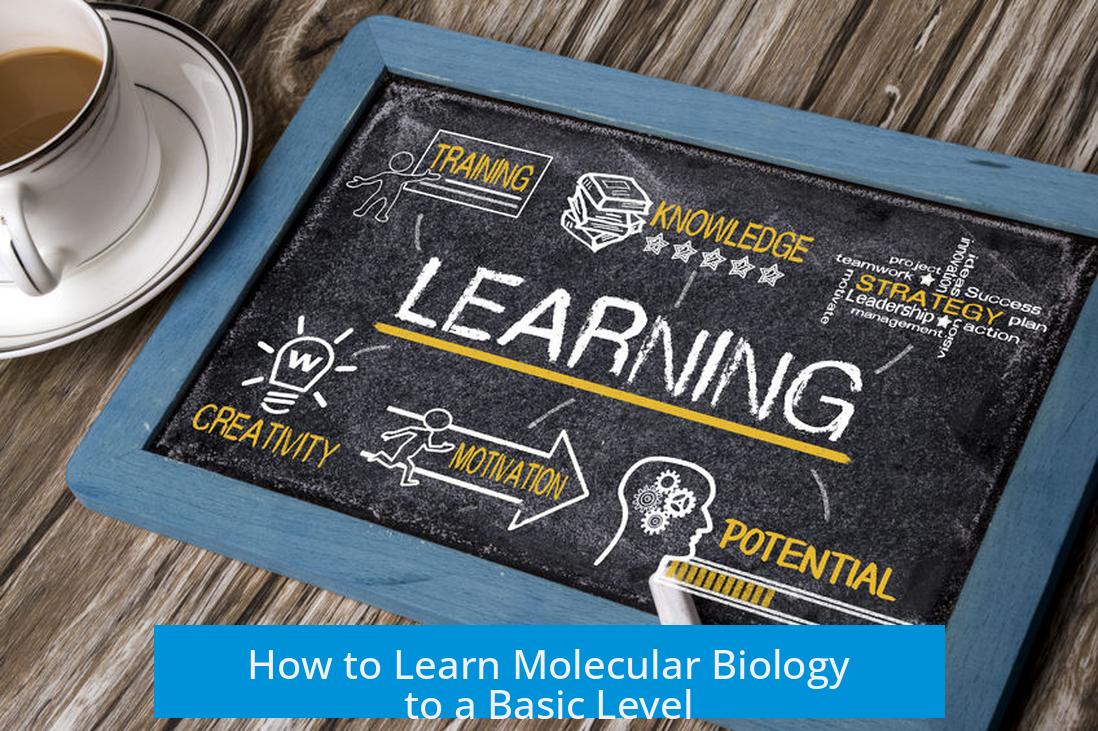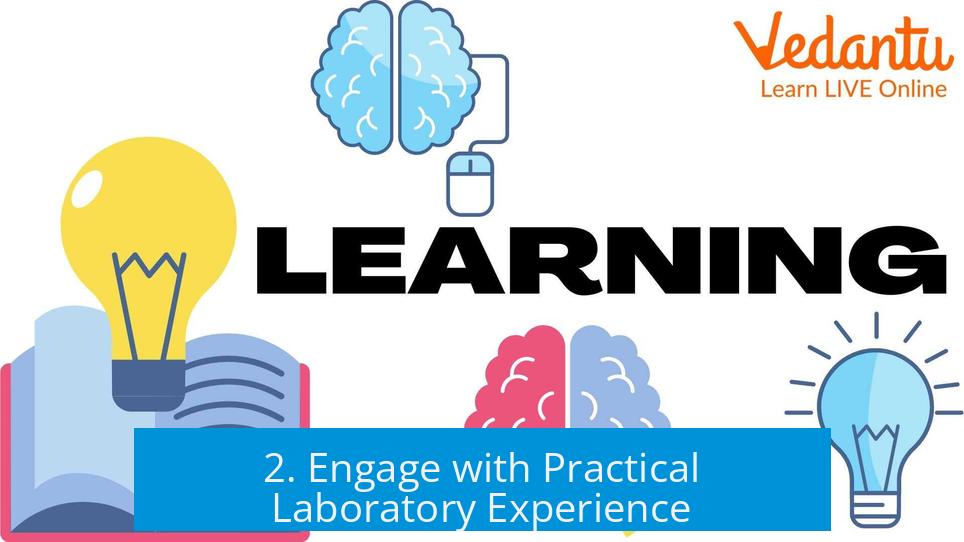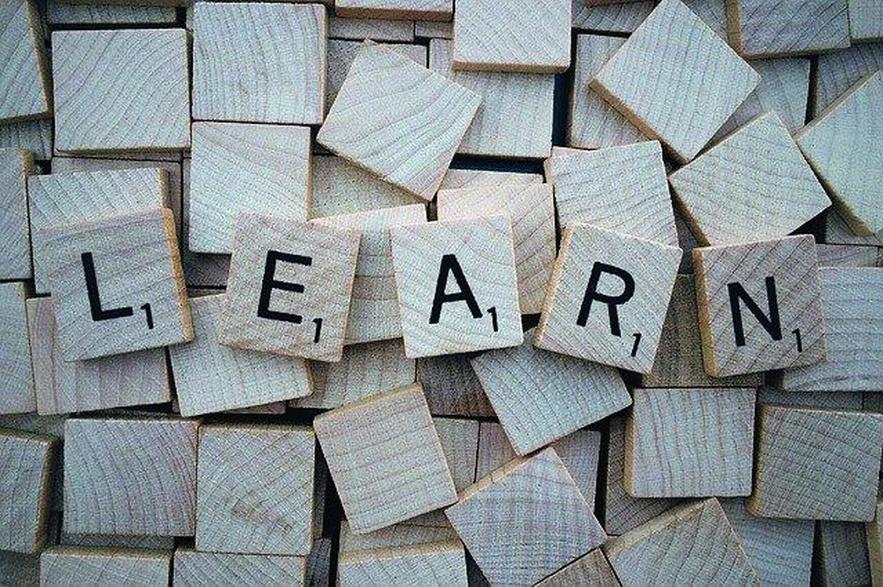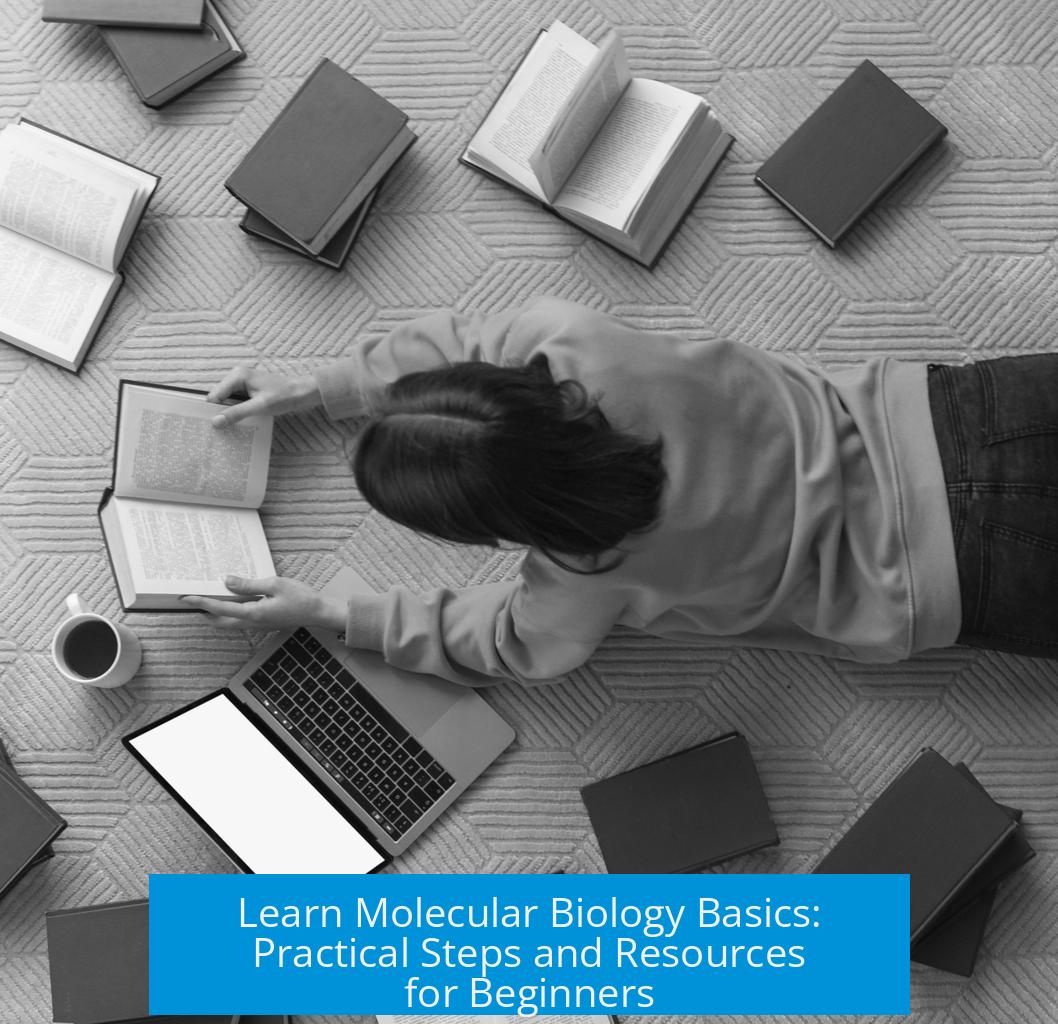How to Learn Molecular Biology to a Basic Level

Learning molecular biology to a basic level requires a strong grasp of foundational biology, practical lab experience, engagement with reputable online and printed resources, and a progressive study approach. Combining theory and practice ensures effective understanding of molecular biology’s core concepts and techniques.
1. Understand the Foundations: Basic Biology and Biochemistry

Molecular biology builds on key biological and biochemical principles. Focus first on understanding the structure and function of cells, DNA, RNA, proteins, and enzymes. Grounding in biochemistry is essential as molecular biology explains life at a molecular scale. This foundational knowledge supports comprehension of processes like replication, transcription, and translation.
- Start with high school biology textbooks to learn cellular components and genetics.
- Explore basic biochemistry concepts such as macromolecules and metabolic pathways.
- Consult biology teachers or mentors to clarify fundamental ideas.
YouTube channels offering educational animations, such as Crash Course Biology, help visualize complex processes. Visualizing molecular interactions aids retention and conceptual clarity.
2. Engage with Practical Laboratory Experience

Lab work cements theoretical knowledge. Practical exposure to molecular biology techniques deepens understanding of concepts like DNA extraction and gel electrophoresis.
- Volunteer or seek internships in molecular biology or microbiology labs.
- Start with simple lab tasks such as preparing media and learning pipetting skills.
- Practice techniques like agarose gel electrophoresis and polymerase chain reaction (PCR).
- Accept errors during experiments as part of the learning process.
Hands-on experience teaches lab safety, sample preparation, and troubleshooting. Familiarity with lab protocols builds confidence, allowing novices to run standard assays efficiently after practice.
3. Utilize Online Resources and Educational Videos

Online platforms supplement learning with accessible, structured content. Khan Academy provides comprehensive biology videos with clear explanations underpinning molecular biology concepts.
- Explore interactive courses on edX to study molecular biology principles and lab techniques.
- Watch laboratory technique videos on JoVE for demonstrations of real lab procedures like gel electrophoresis: JoVE Gel Electrophoresis Video.
- Engage with animations on YouTube to visualize molecular interactions and cellular machinery.
These resources offer stepwise tutorials and allow learners to review content at their own pace, reinforcing understanding through repetition and varied teaching styles.
4. Reference Specialized Educational Websites and Books

Reliable references help deepen knowledge and provide context. Addgene’s Molecular Biology Reference contains clear introductions to cloning, nucleic acid metabolism, and common laboratory methods.
- Visit Addgene’s resource page: Addgene Molecular Biology Reference
- Study foundational books like At The Bench by Kathy Barker, which explains lab techniques and research practices.
- Utilize study guides that break complex pathways into manageable diagrams.
Books and curated online content fill gaps between video materials and hands-on labs, connecting molecular biology concepts and real-world applications.
5. Follow a Progressive Reading Approach

Build competence by starting with easier texts and gradually moving to advanced literature. This method adapts to growing understanding, reinforcing basic concepts before introducing complexity.
- Begin with high school or introductory college biology books.
- Progress to specialized molecular biology textbooks and review papers.
- Incorporate articles and research summaries to connect learning to current science.
This tiered learning helps sustain motivation and ensures steady knowledge acquisition without cognitive overload.
6. Maintain an Open Mind and Explore Broad Biology Areas
Molecular biology intersects with genetics, biochemistry, microbiology, and more. Explore different fields to gain perspective on molecular biology’s scope and applications.
- Be open to learning about various biological subfields to identify areas of interest.
- Understand how molecular biology techniques apply in different contexts like medical research or environmental science.
- Engage with general biology research concepts to complement molecular studies.
This broader approach prevents narrowing focus prematurely, facilitating better appreciation of science’s diversity and interdisciplinary nature.
7. Use Diverse Learning Methods and Resources
Combining study techniques enhances retention and troubleshooting skills.
- Study Guides and Visual Aids: Create diagrams, flowcharts, and flashcards to represent molecular pathways and processes visually.
- Problem Solving: Regularly practice genetic and biochemical problem sets to apply theoretical concepts.
- Study Groups: Participate in group discussions to explain concepts and resolve doubts collaboratively.
- Entertainment: Watch movies like GATTACA to stimulate interest in genetics and biotechnology.
8. Engage with Basic Molecular Biology eLearning Series
Specialized online training programs provide structured molecular biology education. For example, Basic Molecular Biology eLearning offers modular courses designed for beginners.
| Module | Focus Area | Topics Covered |
|---|---|---|
| 1. Basic Science | DNA and RNA fundamentals | Nucleotide pairing, DNA/RNA structure, molecular diagnostic workflows |
| 2. Laboratory Practice | Lab safety and workflow | Biosafety, contamination control, lab area layout |
| 3. Nucleic Acid Extraction | Sample preparation | Extraction methods, protocol steps, nucleic acid quality assessment |
| 4. PCR and Real-Time PCR | Amplification techniques | PCR principles, procedure, product analysis, quantitative real-time PCR |
These concise, interactive modules prepare learners for practical molecular biology techniques with an emphasis on clinical and research relevance. They fit into flexible schedules and provide an effective entry point into molecular diagnostics.
Key Takeaways
- Start by mastering basic biology and biochemistry fundamentals to understand molecular biology concepts.
- Gain hands-on experience in labs to link theory with practice and develop essential techniques like PCR and gel electrophoresis.
- Use reputable online educational platforms such as Khan Academy, JoVE, edX, and Addgene for structured learning.
- Progress through reading materials from simple textbooks to advanced literature, reinforcing knowledge step by step.
- Keep an open mind about different biology fields to broaden perspective and discover specific interests.
- Incorporate varied learning approaches including visual aids, problem-solving, group study, and multimedia entertainment to deepen understanding.
- Enroll in modular eLearning courses that combine basic science and lab practice for a comprehensive introduction to molecular biology.
How to Learn Molecular Biology to a Basic Level
Learning molecular biology doesn’t have to be rocket science, but it does demand a firm grip on the basics—and a willingness to dive in and get your hands a little dirty. Whether you are a high school student curious about the blueprint of life or an eager learner wanting to grasp how molecules shape living systems, this guide will walk you through a grounded, practical approach to mastering molecular biology at a basic level.
Ready to unravel DNA strands, run PCRs, and visualize tiny molecular machines? Let’s start from the beginning.
Begin with Biology and Biochemistry Basics
First things first: molecular biology is a branch of science deeply rooted in biochemistry and biology. You can’t build a sturdy house without a solid foundation, and the same goes for molecular biology. This requires a lifelong commitment to understanding the chemistry of life itself—not just binge-watching a viral YouTube clip.
High school biology textbooks remain invaluable. They introduce you to the fundamental ideas: cell structure, DNA, RNA, proteins, and genetics. But what about more visual learners?
Try Khan Academy for animated explanations of these concepts. Crash Course also offers bite-sized videos that make complex ideas fun, even if they don’t dig deeply into molecular biology specifics. Importantly, ask your biology teacher questions. Engage in conversations. This creates a strong mental map of how biological components interact.
Roll Up Your Sleeves with Laboratory Experience
Reading books and watching videos is fantastic. But molecular biology is a hands-on science. To really grasp it, you need to get practical in a lab setting.
Many successful molecular biologists began their journey as volunteers in university labs during high school. Tasks like preparing microbiology media, purifying plasmids (minipreps), and running agarose gel electrophoresis might sound mundane, but they are essential groundwork.
When learning lab techniques, expect mistakes—and plenty of them. Making errors is part of the process; just make sure not to repeat the same ones twice. Over time, you’ll run gels and perform PCR with confidence. This experiential learning builds not just skills but also resilience and problem-solving ability.
If you’re eyeing this path, consider this: washing glassware once earned a budding scientist their first lab job. Humble beginnings can lead to exciting discoveries.
Online Resources Can Be Your Best Study Pal
In the digital age, you have a treasure trove of free resources at your fingertips. Beyond Khan Academy and Crash Course, there’s JoVE (Journal of Visualized Experiments), which offers quality videos demonstrating lab methods. Many videos are free. They explain techniques like agarose gel electrophoresis step-by-step.
Watching these videos repeatedly can help you understand the workflow and get familiar with scientific jargon. Combine that with animated visuals on YouTube to learn molecular functions. Seeing molecular machines in action beats dry textbook diagrams every time.
Don’t Just Read. Draw. Doodle. Visualize.
Complex biochemical pathways and DNA replication steps can feel overwhelming. Here’s a simple yet powerful tip: draw them out. Creating your own schematics helps cement your understanding better than passively reading endless paragraphs.
Visual aids break down complicated processes into manageable parts. They allow you to see relationships between molecules—a skill scientists use every day. Keep a notebook dedicated to hand-drawn versions of molecular cycles, genetic transcription, or PCR steps.
Explore Specialized Educational Websites and Books
Online resources like Addgene’s Molecular Biology Reference provide concise yet comprehensive explanations about cloning, molecular tools, and gene expression.
On the book front, “At The Bench” by Kathy Barker, though published two decades ago, remains a goldmine for beginners in research labs. It covers practical lab tips, safety, and molecular techniques. This book feels like a mentor guiding you through the tribulations of being a newbie researcher.
Adopt a Progressive Reading Approach
Try starting with simpler texts and gradually move to more challenging scientific literature. Just like learning a language, you first get familiar with basic words before tackling Shakespeare.
Begin with introductory articles or textbooks tailored for high school or college students. Then, explore research summaries or review papers about molecular biology topics that interest you. With time, scientific papers won’t seem like an alien language anymore.
Keep an Open Mind: Molecular Biology Is Vast
If you’re wondering, “What exactly is molecular biology?” you’re in good company. It’s a broad field overlapping genetics, biochemistry, microbiology, and biotechnology.
At your stage, don’t narrow your focus too soon. Instead, explore diverse biology areas. Are you intrigued by DNA’s role in heredity, or fascinated by microbes’ molecular tricks? Perhaps gene editing or molecular diagnostics catch your eye?
Being curious and open helps you find your passion area and prevents frustration. After all, high school is about sampling buffet-style scientific knowledge before you commit.
Boost Your Learning with Interactive Courses
For a structured approach, consider online courses like the Basic Molecular Biology eLearning Series. These courses, designed for public health and clinical lab professionals, cover fundamental topics in digestible chunks:
- Module 1: Basic Science — DNA and RNA traits, base pairing, and fundamental molecular diagnostics.
- Module 2: Laboratory Practice — Lab safety, contamination control, and workflow organization.
- Module 3: Nucleic Acid Extraction — Methods for extracting DNA/RNA and analyzing their quality.
- Module 4: PCR and Real-Time PCR — PCR principles, procedures, and real-time quantification techniques.
Because the modules are interactive, you can easily complete them in small time slots. These courses build a solid knowledge base and prepare you for actual lab work.
Join Study Groups and Tackle Problems Together
Forming a study group can boost your understanding dramatically. Explaining concepts to others helps clarify your own ideas. Plus, discussing challenging genetic problems often reveals different perspectives or tricks.
If you prefer solo study, frequently solve practice problems, especially genetics puzzles. These exercises hone your critical thinking—key when interpreting molecular data.
For Fun: Dive into Science in Pop Culture
Learning should be fun. Why not watch the movie “GATTACA”? It’s a sci-fi thriller rooted in genetic engineering concepts. It highlights how genetic information influences identity and society, bringing molecular biology’s importance into a wider cultural context.
It might not teach you how PCR works but will inspire your curiosity and critical thinking about what molecular biology means beyond the lab bench.
Wrapping Up: Learn Molecular Biology—One Molecule at a Time
To learn molecular biology at a basic level, start with solid basics, immerse yourself in practical lab work, explore quality online educational resources, and keep your curiosity wide open. Use visual aids, join study groups, and remember—mistakes are stepping stones to mastery.
It’s a journey. With patience and practice, you’ll soon understand the invisible threads governing life, and who knows, maybe you’ll contribute even the tiniest stitch to the vast, ongoing tapestry of molecular biology.
So, what part of molecular biology excites you the most right now? DNA replication? Gene editing? Or just learning how to run a gel? Drop a thought below and let’s discuss!
1. What foundational topics should I master before diving into molecular biology?
Start with basic biology and biochemistry. Understand cell components, DNA, RNA, and basic genetic principles. High school biology textbooks and resources like Khan Academy can help build this foundation.
2. How important is hands-on lab experience for beginners?
Lab work is essential. Simple tasks like running agarose gels and preparing media help you understand molecular biology practically. Mistakes are part of learning, so gain experience early in a lab setting.
3. Which online resources are reliable for beginners in molecular biology?
Check out Khan Academy for basic biology concepts and Jove for lab technique videos. Platforms like edX offer structured courses. Addgene’s website provides good introductions to cloning and molecular methods.
4. How should I approach reading molecular biology literature as a beginner?
Start with easy-to-understand texts or guides. Gradually progress to more complex books and research papers. Visual aids and drawing molecular processes can enhance understanding.
5. Can study groups and problem-solving improve learning molecular biology?
Yes. Discussing concepts in groups helps reinforce knowledge. Regularly solving genetic problems builds problem-solving skills critical in molecular biology studies.
6. Are there specialized eLearning courses designed for basic molecular biology?
Yes. The Basic Molecular Biology eLearning Series offers courses on DNA/RNA basics, lab practices, nucleic acid extraction, and PCR. These modules are interactive and suitable for beginners.





Leave a Comment